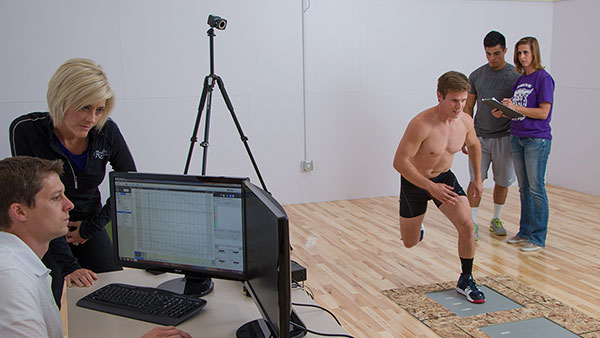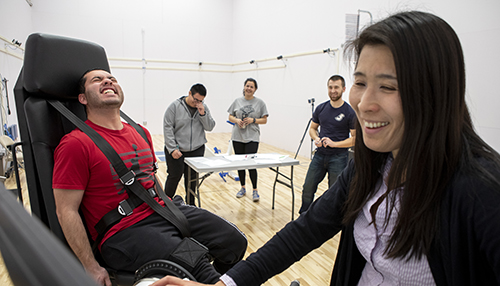In this concentration, you’ll learn how exercise and sports impact your health. Courses cover anatomy and physiology, structural kinesiology and biomechanics. Exercise science explores the science behind fitness, exercise metabolism, and overall wellness.
Exercise & Sport Science
A degree in Exercise and Sport Science provides an excellent foundation for a rewarding career in health and fitness and/or graduate studies in the medical sciences.
Emphases
In this concentration, you’ll learn about anatomy and physiology, fitness assessment, exercise programming and implementation, exercise leadership and client education, strength and conditioning, and nutrition, while developing skills in activities such as weight lifting, aerobic activities, and more. Courses also cover topics like health, nutrition education and kinesiology.

Clinical Exercise Physiology
In this concentration, you’ll learn about the competencies needed for an exercise physiologist in the cardiac rehabilitation setting. Courses cover anatomy and physiology, nutrition education and cardiac sciences.
Additional Information
ESS Mission Statement
The Exercise and Sport Science (ESS) Program supports the university’s mission of cultivating successful students by teaching inductive and logical reasoning, evidence-supported problem solving and decision-making, as well as exercise science-specific knowledge and skills through effective instruction and scholarly and community engagement. Graduates will become successful in facilitating positive and active lifestyles through conducting health and fitness evaluations and designing appropriate exercise prescriptions to individuals of diverse populations.
Accreditation Status
The Weber State University Exercise and Sport Science program with an emphasis in Strength and Conditioning is currently seeking accreditation from the Council on Accreditation of Strength and Conditioning Education (CASCE), a recognized authority in quality strength and conditioning education. This pursuit reflects our dedication to achieving the highest standards of quality and excellence in our strength and conditioning program. Our curriculum, faculty, and facilities are undergoing a thorough evaluation process to ensure that we provide students with the essential knowledge, skills, and practical experience needed to excel in the field of strength and conditioning while prioritizing athlete safety.
Three-Year Aggregate Certification Exam Passing Rate
Most students take the CSCS exam after completing their degree. Because there have not yet been any graduates from the BS in Exercise and Sport Science program with Strength & Conditioning Emphasis, there are currently no CSCS pass rates available for this group.
Retention Rate
As of fall 2025, no students have yet graduated from the BS in Exercise and Sport Science program with Strength & Conditioning Emphasis. As a result, retention rates related to graduation cannot be calculated.
Graduation Rate
As of fall 2025, no students have yet graduated from the BS in Exercise and Sport Science program with Strength & Conditioning Emphasis.
One-Year Employment Placement Rate
As of fall 2025, no students have yet graduated from the BS in Exercise and Sport Science program with Strength & Conditioning Emphasis.
Advisement
Have questions? Feel free to reach out to our academic advisor!

